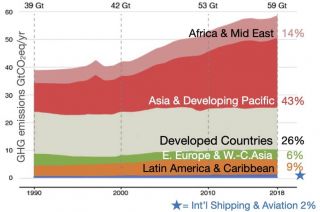
www.buildingsandcities.org/insights/commentaries/cop26-scaling.html
Sustainable and Climate Resilient Cities? Stop Experimenting, Start Scaling

By Jeroen van der Heijden (Victoria University of Wellington, NZ and Australian National University, AU)
COP-26 represents an important turning point for cities, the research community and NGOs. We must shift away from creating more experiments and now move toward implementation and the challenges of scaling. City governments and their stakeholders may be better off to begin asking
questions like: Has the problem we want to solve been solved elsewhere? Can we replicate
or adjust a proven-to-work intervention from elsewhere?
A few things have become crystal clear considering cities and climate change since the 1990s:
- For ordinary citizens climate action at street, neighbourhood, and city level is easier to understand, easier to agree with, and easier to participate in than climate action at any other level (regional, national, or international). It is, therefore, typically argued that cities are uniquely positioned to take meaningful climate action where nation states cannot.
- We know what types of technologies are needed to reduce GHGs at city level and reduce the vulnerability of cities to the consequences of climate change. Such technologies are widely available, and their costs have come down dramatically (e.g., production of renewable energy at building level, electric vehicles). We also know what sort of changes in people's behaviour are needed to achieve these goals (e.g., increased recycling of urban waste, reduced car transport).
- Cities must engage actively in urban climate governance and should not wait for their national governments to introduce climate change adaptation and mitigation policies. To this end, cities can cooperate with other cities in (regional, national, or international) climate city networks (e.g., ICLEI, C40). They can collaborate with citizens and firms within their jurisdiction (e.g., Transition Town Network). Then can even embrace private sector and non-governmental initiatives that provide 'off the shelf' urban climate action (e.g., the Rockefeller Foundation's 100 Resilient Cities program that has merged into the Resilient Cities Network).
An explosion of urban climate experiments
Such insights have resulted from a vast amount of urban climate experiments carried out in thousands of cities around the world. These experiments involve purposeful and strategic activities that explicitly aim to capture new lessons and experiences about (existing and novel) urban climate interventions (including technology, behaviour, and governance) (Castán Broto & Bulkeley, 2013). This trend of experimentation has long been lauded by academics and policymakers as being the answer to the pressing question of how cities can respond to global warming.
Slowly, however, critical questions are being raised about this trend of experimentation. Not all cities are or can be equally involved in experimentation. Experiments have successfully harvested the 'low hanging' fruit (e.g., increased energy efficiency of new buildings) but find it difficult to tackle more challenging problems (e.g., energy retrofits of existing buildings). Experiments typically address a part of the 'urban climate action puzzle' but not the interaction between the 'pieces', let alone the puzzle as a whole.
Perhaps the biggest challenge related to this experimentation is that cities find it difficult, or are perhaps unwilling, to learn from each other and replicate each other's proven-to-work interventions (Wolfram, Van der Heijden, Juhola, & Patterson, 2019). Arguably, thinking up something novel and experimenting with it is fun and exciting (and may result in a climate leadership award by an international organization), whilst replicating and repeating is a bit dull and uninspiring (and will certainly not lead to accolades).
Towards (a better understanding of) scaling
The growing critical observations about this experimentation all point at a common denominator: a scaling challenge. It is safe to say that we have reached a point where we need to think critically and systematically about how to stabilize and accelerate, how to broaden and grow, and how to replicate and transfer the proven-to-work interventions that have resulted from three decades of experimentation.
This will require a change of mindset. Rather than taking what appears to be the default position and start another (niche) experiment to solve a part of the urban climate action puzzle, city governments and their stakeholders may be better off to begin asking questions like: Has the problem we want to solve been solved elsewhere? Can we replicate or adjust a proven-to-work intervention from elsewhere? Cities already have access to (the results of) the thousands of urban climate governance experiments carried out since the 1990s, documented by scholars, think tanks, climate city networks, NGOs, and the like.
These scholars, think tanks, climate city networks, and NGOs also need to change their mindset. Rather than documenting yet another (niche) experiment, they will do cities a huge favour by exploring (1) what factors may contribute to or hamper the scaling of proven-to-work climate action, (2) whether there are proven-to-work trajectories of scaling, and (3) explore the sorts of changes or systemic shifts that can be expected from scaling (e.g., negative and positive impacts of scaling urban climate action on other societally relevant areas).
References
Castán Broto, V., & Bulkeley, H. (2013). A survey of urban climate change experiments in 100 cities. Global Environmental Change, 23(1), 92-102.
Wolfram, M., Van der Heijden, J., Juhola, S., & Patterson, J. (2019). Learning in urban climate governance: Concepts, issues and challenges. Journal of Environmental Policy & Planning, 21(1), 1-15.
Latest Peer-Reviewed Journal Content
Energy sufficiency, space temperature and public policy
J Morley
Living labs: a systematic review of success parameters and outcomes
J M Müller
Towards a universal framework for heat pump monitoring at scale
J Crawley, L Domoney, A O’Donovan, J Wingfield, C Dinu, O Kinnane, P O’Sullivan
Living knowledge labs: creating community and inclusive nature-based solutions
J L Fernández-Pacheco Sáez, I Rasskin-Gutman, N Martín-Bermúdez, A Pérez-Del-Campo
A living lab approach to co-designing climate adaptation strategies
M K Barati & S Bankaru-Swamy
Mediation roles and ecologies within resilience-focused urban living labs
N Antaki, D Petrescu, M Schalk, E Brandao, D Calciu & V Marin
Negotiating expertise in Nepal’s post-earthquake disaster reconstruction
K Rankin, M Suji, B Pandey, J Baniya, D V Hirslund, B Limbu, N Rawal & S Shneiderman
Designing for pro-environmental behaviour change: the aspiration–reality gap
J Simpson & J Uttley
Lifetimes of demolished buildings in US and European cities
J Berglund-Brown, I Dobie, J Hewitt, C De Wolf & J Ochsendorf
Expanding the framework of urban living labs using grassroots methods
T Ahmed, I Delsante & L Migliavacca
Youth engagement in urban living labs: tools, methods and pedagogies
N Charalambous, C Panayi, C Mady, T Augustinčić & D Berc
Co-creating urban transformation: a stakeholder analysis for Germany’s heat transition
P Heger, C Bieber, M Hendawy & A Shooshtari
Placemaking living lab: creating resilient social and spatial infrastructures
M Dodd, N Madabhushi & R Lees
Church pipe organs: historical tuning records as indoor environmental evidence
B Bingley, A Knight & Y Xing
A framework for 1.5°C-aligned GHG budgets in architecture
G Betti, I Spaar, D Bachmann, A Jerosch-Herold, E Kühner, R Yang, K Avhad & S Sinning
Net zero retrofit of the building stock [editorial]
D Godoy-Shimizu & P Steadman
Co-learning in living labs: nurturing civic agency and resilience
A Belfield
The importance of multi-roles and code-switching in living labs
H Noller & A Tarik
Researchers’ shifting roles in living labs for knowledge co-production
C-C Dobre & G Faldi
Increasing civic resilience in urban living labs: city authorities’ roles
E Alatalo, M Laine & M Kyrönviita
Co-curation as civic practice in community engagement
Z Li, M Sunikka-Blank, R Purohit & F Samuel
Preserving buildings: emission reductions from circular economy strategies in Austria
N Alaux, V Kulmer, J Vogel & A Passer
Urban living labs: relationality between institutions and local circularity
P Palo, M Adelfio, J Lundin & E Brandão
Living labs: epistemic modelling, temporariness and land value
J Clossick, T Khonsari & U Steven
Co-creating interventions to prevent mosquito-borne disease transmission in hospitals
O Sloan Wood, E Lupenza, D M Agnello, J B Knudsen, M Msellem, K L Schiøler & F Saleh
Circularity at the neighbourhood scale: co-creative living lab lessons
J Honsa, A Versele, T Van de Kerckhove & C Piccardo
Positive energy districts and energy communities: how living labs create value
E Malakhatka, O Shafqat, A Sandoff & L Thuvander
Built environment governance and professionalism: the end of laissez-faire (again)
S Foxell
Co-creating justice in housing energy transitions through energy living labs
D Ricci, C Leiwakabessy, S van Wieringen, P de Koning & T Konstantinou
HVAC characterisation of existing Canadian buildings for decarbonisation retrofit identification
J Adebisi & J J McArthur
Simulation and the building performance gap [editorial]
M Donn
Developing criteria for effective building-sector commitments in nationally determined contributions
P Graham, K McFarlane & M Taheri
Join Our Community

The most important part of any journal is our people – readers, authors, reviewers, editorial board members and editors. You are cordially invited to join our community by joining our mailing list. We send out occasional emails about the journal – calls for papers, special issues, events and more.
We will not share your email with third parties. Read more



Latest Commentaries
COP30 Report
Matti Kuittinen (Aalto University) reflects on his experience of attending the 2025 UN Conference of the Parties in Belém, Brazil. The roadmaps and commitments failed to deliver the objectives of the 2025 Paris Agreement. However, 2 countries - Japan and Senegal - announced they are creating roadmaps to decarbonise their buildings. An international group of government ministers put housing on the agenda - specifying the need for reduced carbon and energy use along with affordability, quality and climate resilience.
Building-Related Research: New Context, New Challenges
Raymond J. Cole (University of British Columbia) reflects on the key challenges raised in the 34 commissioned essays for Buildings & Cities 5th anniversary. Not only are key research issues identified, but the consequences of changing contexts for conducting research and tailoring its influence on society are highlighted as key areas of action.